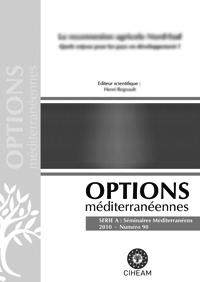| Article précédent | p. 203-208 | Article suivant |
The Moroccan experience with feed blocks: Research and development
A few years ago, the Moroccan Ministry of Agriculture promoted the use of a feed block formula based on sugar beet molasses (40 percent) and wheat bran (30 percent). The handling difficulties of molasses and their newly emerging and competing uses for yeast and alcohol production, hampered the adoption of this formula. The National Institute of Agricultural Research has conducted research for the last five years to address these questions. Early research tested the use of feed blocks by sheep as a supplement against other alternatives, particularly during stubble grazing. Later on, research aimed at testing physical properties, cost and animal utilisation of different block formulae. This paper describes the early development phases of block making and use by the Ministry of Agriculture and presents the available results from both on-station and on-farm research, it concludes with the outcome of a first scaling up experience (joint venture INRA and NGO's) of block production and the perspectives ahead.
- [ Afficher ]
- [ Télécharger ]
- [ Exporter la citation ]
Vous pouvez télécharger la citation au format :
- [ Imprimer ]
-
Mots-clés
ALIMENTATION COMPLEMENTAIRE, MAROC, OVIN, ZONE SEMI-ARIDECiter cet article
Boulanouar B., Chriyaa A., Tarhzouti O., Sahnoun A. The Moroccan experience with feed blocks: Research and development. In : Ben Salem H. (ed.), Nefzaoui A. (ed.), Morand-Fehr P. (ed.). Nutrition and feeding strategies of sheep and goats under harsh climates . Zaragoza : CIHEAM, 2004. p. 203-208. (Options Méditerranéennes : Série A. Séminaires Méditerranéens; n. 59). 9. Seminar of the Sub-Network on Nutrition of the FAO-CIHEAM Inter-Regional Cooperative Research and Development Network on Sheep and Goats, 2001/11/08-10, Hammamet (Tunisia). http://om.ciheam.org/om/pdf/a59/04600029.pdf



